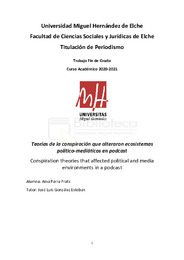Por favor, use este identificador para citar o enlazar este ítem:
https://hdl.handle.net/11000/34016Teorías de la conspiración que alteraron ecosistemas político-mediáticos en podcast
| Título : Teorías de la conspiración que alteraron ecosistemas político-mediáticos en podcast |
| Autor : Parra Prats, Aina |
| Tutor: González-Esteban, José Luis |
| Editor : Universidad Miguel Hernández de Elche |
| Departamento: Departamentos de la UMH::Ciencias Sociales y Humanas |
| Fecha de publicación: 2024-09 |
| URI : https://hdl.handle.net/11000/34016 |
| Resumen : El presente Trabajo de Fin de Grado presenta la creación de un podcast de cinco capítulos que explora cómo diversas teorías de la conspiración han influido en la sociedad durante periodos electorales en la historia moderna. A través de entrevistas con expertos y análisis de eventos históricos, se examina el impacto de estas teorías en la opinión pública y en los resultados electorales. En el primer capítulo, se entrevista a un psicólogo que analiza el efecto psicológico de las teorías de la conspiración tanto en las masas como en las personas como seres individuales. Se discuten temas como la funcionalidad de las teorías de la conspiración en la sociedad y la repercusión de estas en nuestra confianza y en nuestra visión del mundo. El segundo capítulo presenta una entrevista con un periodista que aborda el papel de los medios de comunicación en la difusión de teorías de la conspiración. Se examina cómo la cobertura mediática puede amplificar estas teorías y su impacto en la percepción pública a la vez que se aclaran los conceptos de bulo, desinformación o paranoia. El tercer capítulo se centra en el atentado del 11-M en España. Se describen las teorías de la conspiración que surgieron tras el ataque y cómo estas afectaron las elecciones generales de 2004, influyendo en la opinión pública y en el resultado electoral. En el cuarto capítulo, se analiza el caso del Pizzagate y su impacto en la derrota de Hillary Clinton en las elecciones presidenciales de 2016 en Estados Unidos. Se explora cómo esta teoría de la conspiración se propagó y afectó la campaña electoral creando, a su vez, muchos movimientos diferentes y otras tantas teorías nuevas. El quinto y último capítulo trata sobre el accidente de tren de Larissa, Grecia, ocurrido en 2023. Se discuten las teorías de la conspiración que surgieron tras el accidente y su impacto en la sociedad griega y sobre todo en los estudiantes. Este podcast ofrece una visión profunda y crítica sobre cómo las teorías de la conspiración pueden moldear la opinión pública y afectar procesos electorales, destacando la importancia de la información veraz y la responsabilidad de los medios de comunicación. This Bachelor’s Thesis presents the creation of a five-episode podcast that explores how various conspiracy theories have influenced society during electoral periods in modern history. Through interviews with experts and analysis of historical events, the impact of these theories on public opinion and electoral outcomes is examined. In the first episode, a psychologist analyses the psychological effect of conspiracy theories on the masses and individuals. Topics such as the functionality of conspiracy theories in society and their impact on our trust and worldview are discussed. The second episode features an interview with a journalist who addresses the role of the media in spreading conspiracy theories. It examines how media coverage can amplify these theories and their impact on public perception while clarifying concepts such as hoaxes, misinformation, and paranoia. The third episode focuses on the 11-M attack in Spain. The conspiracy theories that emerged after the attack and how they affected the 2004 general elections, influencing public opinion and the electoral outcome, are described. In the fourth episode, the Pizzagate case and its impact on Hillary Clinton’s defeat in the 2016 U.S. presidential elections are analysed. It explores how this conspiracy theory spread and affected the electoral campaign, creating many different movements and new theories. The fifth and final episode deals with the train accident in Larissa, Greece, which occurred in 2023. The conspiracy theories that emerged after the accident and their impact on Greek society, especially on students, are discussed. This podcast offers a deep and critical insight into how conspiracy theories can shape public opinion and affect electoral processes, highlighting the importance of truthful information and the responsibility of the media. |
| Palabras clave/Materias: Teoría de la conspiración elecciones medios bulo desinformación Conspiracy theory elections media hoax disinformation |
| Área de conocimiento : CDU: Generalidades.: Periódicos. Prensa. Periodismo. Ciencias de la información |
| Tipo de documento : info:eu-repo/semantics/bachelorThesis |
| Derechos de acceso: info:eu-repo/semantics/openAccess Attribution-NonCommercial-NoDerivatives 4.0 Internacional |
| Aparece en las colecciones: TFG - Doble Grado en Comunicación Audiovisual y Periodismo |
 La licencia se describe como: Atribución-NonComercial-NoDerivada 4.0 Internacional.
La licencia se describe como: Atribución-NonComercial-NoDerivada 4.0 Internacional.
.png)
